|
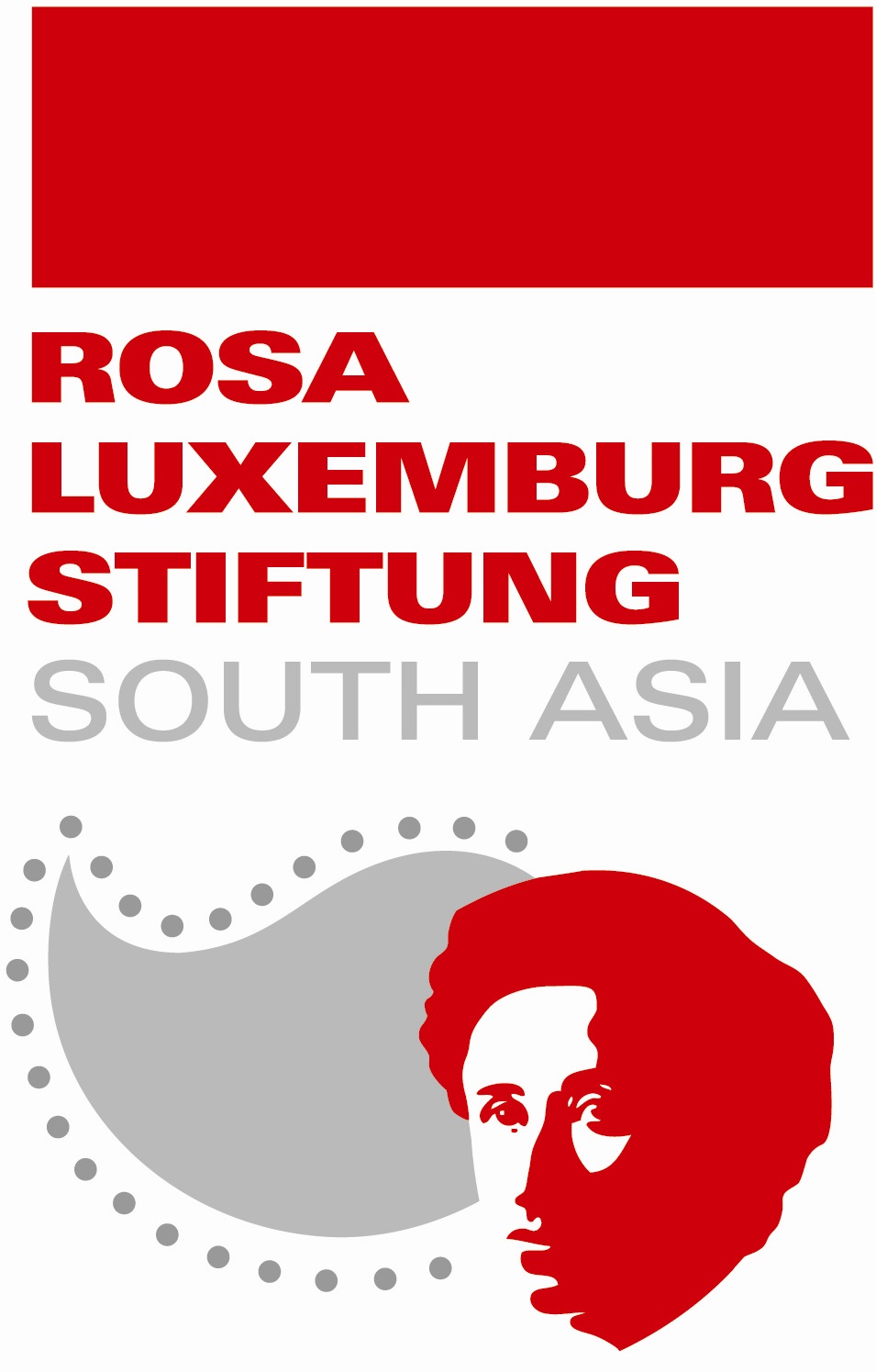
Researchers & Experts in 2016 ||
Researchers & Experts
in 2017 ||
Researchers & Experts
in 2018

Researchers & Experts in 2018
|
Sl. No. |
Picture |
Bio Note |
|
|
|
|
1. |
Topic:
Connectivity as Defining Future of India's Look East Policy |
Abstract |
|
|
| |

|
Swaran Singh
is Professor of Disarmament Studies at the Centre for
International Politics, Organisation and Disarmament (CIPOD),
School of International Studies, Jawaharlal Nehru University
(New Delhi). He is President of Association of Asia
Scholars, General Secretary of Indian Association of Asian &
Pacific Studies, Visiting Professor, China West Normal
University and Guest Professor at Research Institute of
Indian Ocean Economies (RIIO), Yunnan University of Finance
and Economics (China), and Advisory Board Member of
Atlanta-based Communities Without Borders Inc. He was Chief
Vigilance Officer of his University (2012-15) and External
Member to its Centre for East Asian Studies of JNU. Prof
Singh has 25 years of experience in research and teaching
and lectures at major institutions like National Defence
College, Defence Services Staff College, and all other major
military institutions as also Foreign Service Institute,
Indian Institute for Public Administration etc. as also
contributes to radio and television discussions. His most
recent research article on "State of India's Security
Studies" published in recent issue of Millennial Asia
(Sage, Sept-Nov 2015) at
http://www.jnu.ac.in/Faculty/ssingh/State_of_Security.pdf
Prof Singh travels and writes extensively on Asian Affairs,
China’s foreign and security policy issues with special
focus on China-India confidence building measures as also on
Arms Control and Disarmament, Peace and Conflict Resolution,
India’s foreign and security policy issues. He has
co-edited BCIM Economic Corridor Chinese and Indian
Perspectives (Adroit 2017), Transforming South Asia:
Imperatives for Action (2013); India and the GCC Countries,
Iran and Iraq: Emerging Security Perspectives (2013), On
China By India: From Civilization to State
(Cambria 2012),
Emerging China: Prospects for Partnership in Asia
(Routledge 2012), Asia’s
Multilateralism
(in Chinese, 2012) published from Shanghai; Edited
China-Pakistan Strategic Cooperation: Indian Perspectives
(2007) Co-authored Regionalism in South Asian Diplomacy
(SIPRI Policy Paper No. 15, February 2007) and authored
Nuclear Command & Control in Southern Asia: China, India,
Pakistan (2010), China-India Economic Engagement:
Building Mutual Confidence (2005), China-South Asia:
Issues, Equations, Policies (2003), China’s Changing
National Security Doctrines (1999) and Limited War:
The Challenge of US Milit
PAGE 11ary Strategy
(1995). His e-mail is
swaransingh@hotmail.com |
|
2. |
Topic:
India in the Connectivity Matrix |
Abstract |
|
|
| |
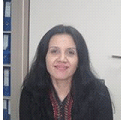
|
Priya Singh is Research and Programme Associate at
the Calcutta Research Group (CRG). She is an area
specialist and has been tracking the West Asian region with
Israel as an area of special interest. She has been writing
consistently on the issue of migration, displacement and
refugees be it the Palestinian refugees or as in recent
times, the Syrians. Priya has been Fellow at the
Maulana Abul Kalam Azad Institute of Asian Studies, Kolkata
from March 2002-April 2016. Her areas of interest
include the Middle East conflict, state formation in Israel,
issues pertaining to gender, minorities and marginalised
communities such as the Arab Jews, the Bedouins of Negev,
and the Palestinians in Israel. She has authored,
edited, co-edited publications on the region. Her research
work has also been published in peer reviewed journals and
as book chapters. She is a member of the editorial board of
the
Journal of Indo-Judaic Studies published by the
International University of Florida Press. As part of
her research, Priya has done extensive fieldwork, be it Tel
Aviv, Jaffa, Jerusalem, Haifa, Beersheba, Ashdod/Ashkelon,
Gaza and the West Bank. She has been part of the prestigious
annual Tel Aviv University (TAU) workshop, which enabled her
to travel extensively in different parts of Israel. In
connection with her project, she has visited Turkey (Ankara
and Istanbul) and has been to Egypt after the protests in
Taksim and Tahrir Square, covering Cairo, Alexandria and
Luxor. She has visited Kabul as part of an academic
delegation to Afghanistan. Priya has attended and made
presentations in several international seminars. As Fellow
at the Maulana Abul Kalam Azad Institute of Asian Studies,
Kolkata, Priya has also been the programme coordinator of
the West Asia programme and has organized various
international seminars in collaboration with and active
participation from the University of Cairo, the American
University of Cairo, the American University of Beirut,
University of Jerusalem, Tel Aviv University, the Ben Gurion
University, the University of Haifa, the Open University of
Israel and the Zirve University, among others. Priya
is proficient in English and Hindi and has a working
knowledge of Bengali, Urdu and Hebrew. She is at present
learning Arabic. |
|
|
3. |
Topic:
India’s Asia-Pacific Strategy: A Bridge to the Asian
Neighbourhood |
Abstract |
|
|
| |
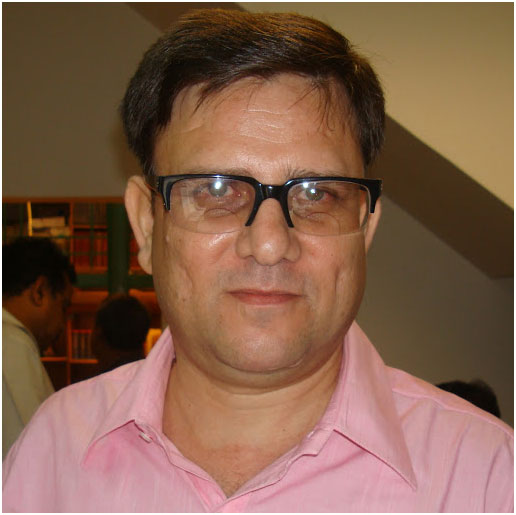 |
Raj Kumar Kothari, is Professor, Department of
Political Science, Vidyasagar University, Midnapore, West
Bengal. Educated at Kalyani University, West Bengal; School
of International Studies, Pondicherry University,
Pondicherry; and Mumbai University, Maharashtra, he
completed his Ph.D. under the Ford Foundation Programme in
International Relations from Mumbai University, Maharashtra.
He has published more than thirty research articles in
various reputed journals and newspapers from India and
abroad and has also authored/edited six books including
From Communism to Democratic Freedom: Perestroika and New
Thinking of Mikhail Gorbachev (1994); India’s Foreign
Policy in the New Millennium (2010); Emerging India
As a Global Player: Growing Ties & Challenges (2012);
US Policy towards China, India & Japan: New Challenges &
Prospects (2013) etc. Currently he is engaged in a
research project on Central Asia. |
|
|
4. |
Topic:
BCIM: Cooperation and Challenges |
Abstract |
|
|
| |

|
Swatilekha
Bhattacharya is an Assistant Professor in the Department
of Political Science with Rural Administration, Vidyasagar
University. Having studied Political Science in Presidency
College, Kolkata, she received her MA in International
Relations from School of International Studies, Jawaharlal
Nehru University, New Delhi. She received her MPhil from the
Centre for International Politics, Organisation and
Disarmament, School of International Studies, JNU and has
submitted her doctoral thesis. Her area of interest is
Security Studies, Critical Security Studies, International
Relations Theories and Indian Politics. She has written
papers focussing on security, foreign policy, exclusion and
gender. |
|
|
5. |
Topic:
Cross-Border Logistic
Expansion under ‘Act East Policy’ in the light of
Development Interest of India’s Northeast |
Abstract |
|
|
| |
 |
Gurudas Das
is currently Professor at the National Institute of
Technology (NIT), Silchar, Assam. Earlier, he had worked in
North Eastern Hill University (NEHU), Shillong, as a Reader
in Economics; AmiyaKumar Das Institute of Social Change and
Development (OKDISCD), Guwahati, as a Research Fellow; and
St Anthony’s College, Shillong, as a Lecturer in Economics .
He graduated from ABN Seal College, Coochbehar and later did
his Masters and Ph D from the University of North Bengal,
Siliguri, West Bengal. For last 25 years, he has been
working and writing on the society, economy and polity of
India’s Northeast. He has pioneered studies on border trade
and advocated to use cross-border trade and sub-regional
cooperation as strategies for the development of the
bordering regions in North East India. His book on
Security and Development in India’s Northeast (OUP,
2012) and co-authored and co-edited volume on Look East
to Act East: Implications for India’s Northeast (Routledge,
2016) have received wide acclamation. He is widely published
and traveled in and outside the country. Besides teaching
and social research, he also provides consultancy services
to a number of research and business organizations in the
country. He has been nominated, as a member, to different
academic and research bodies in and outside the region. He
is the founder of Society for North East Development
Studies (SNEDS) and editor of The Social Scanner.
He is currently working on a compilation on BCIM:
Interplay of Geo-politics and Geo-economics.
Email:
gurudas_das@yahoo.co.in |
|
|
6. |
Topic:
India’s Look East Policy – Some Aspects of Trade and
Logistics |
Abstract |
| |
| |
|
Sebak Jana is currently Professor of Economics and
HOD of the Department of Economics with Rural Development,
Vidyasagar University, West Bengal, India. Dr. Jana did his
post graduation in Economics from Presidency College,
University of Calcutta in 1991. He obtained M.Phil. and
Ph.D. degree in Economics from Jadavpur University, Kolkata.
His major area of academic interest includes environmental
and resource economics, agricultural economics, rural
development and economics of education. He has about seventy
publications in Journals and edited books. He, as Principal
Investigator, has completed a few research projects funded
by ICSSR, UGC and NABARD and IWMI. He has published eight
books wbooks include Tank Irrigation in the Dry Zones in
India, Concept Publishing Co., New Delhi; Education
in West Bengal – Looking Beyond Schools, Shipra
Publications, New Delhi; Financial Sector Liberalization
in India – Theory and Empirics ( Co-editor), Regal
Publications, New Delhi. |
|
|
7. |
Topic:
India’s Look East Policy and the Northeast: Challenges Ahead |
Abstract |
| |
| |
 |
Suratha Kumar Malik, Assistant Professor, Dept. of
Political Science with Rural Administration, Vidyasagar
University, has completed his M.A. and M.Phil from the
Centre for Political Studies, Jawaharlal Nehru University,
New Delhi. His research interest and specialisation include
Dalit and Tribal issues, movement, socio-political movement,
identity issues and Tribal-Dalit politics, Indian Western
political thought and philosophy. He has published books,
articles and chapters in edited books in national and
international publications and journals. Presently engaged
in a UGC sponsored research project on the tribals of
Koraput (Odisha), he was previously awarded the Nirman
Foundation Fellowship (Lord Bhikhu Parekh endowment) for
consecutive two years. |
|
| |
|
|
|

Researchers & Experts in 2017
|
Sl. No. |
Picture |
Bio Note |
|
|
Researchers |
|
1. |
Research Topic:
Trade, Capital and Conflict: Frontier Towns of Northeast
India and Myanmar |
Abstract |
|
Draft Paper |
| |

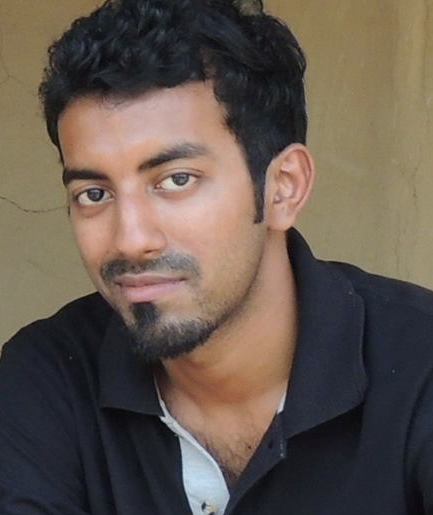 |
Soma Ghosal is an Assistant Professor of Political
Science with SRSVM, Kamarpukur, Hooghly. She is doing her
doctoral studies on the border tribes on India's northeast
and Myanmar. She was earlier a Project Fellow with the
Maulana Abul Kalam Azad Institute of Asian Studies, Kolkata.
Her areas of interest have been the problems of narcotics in
Manipur and its socio-political impact. She had undertaken a
field trip to the Moreh border in 2002 and has a publication
to the effect titled "The Politics of Narcotics in India's
Northeast."
Snehasish
Mitra
He is a Research Assistant in Calcutta Research Group (CRG).
He completed his masters in the discipline of 'Ecology,
Environment and Sustainable Development' from the Tata
Institute of Social Sciences, Guwahati, Assam (India). His
masters dissertation focussed on the issues surrounding the
settlements on the hills of Guwahati, mainly through legal
and environmental paradigms. He has worked as a Research
Assistant in a project supported by Stockholm University
(Sweden) which aimed to understand the phenomenon of labour
migration from Northeast India to other parts of India and
into the wider global network. His reserach interests are -
migration, urban studies, environmental justice and
political ecology. In 2016 he worked on India's Look East
Policy with specific focus on Northeast India which resulted
in a co-authored publication with Ranabir Samaddar titled
'Bridge of Spaces: East by Northeast, Ah! The Northeast'.
(Policy and Practices, 76) Email: snehashish@mcrg.ac.in |
|
2. |
Research Topic:
Conflict and Social Governance in North East India |
Abstract |
|
Draft Paper |
| |
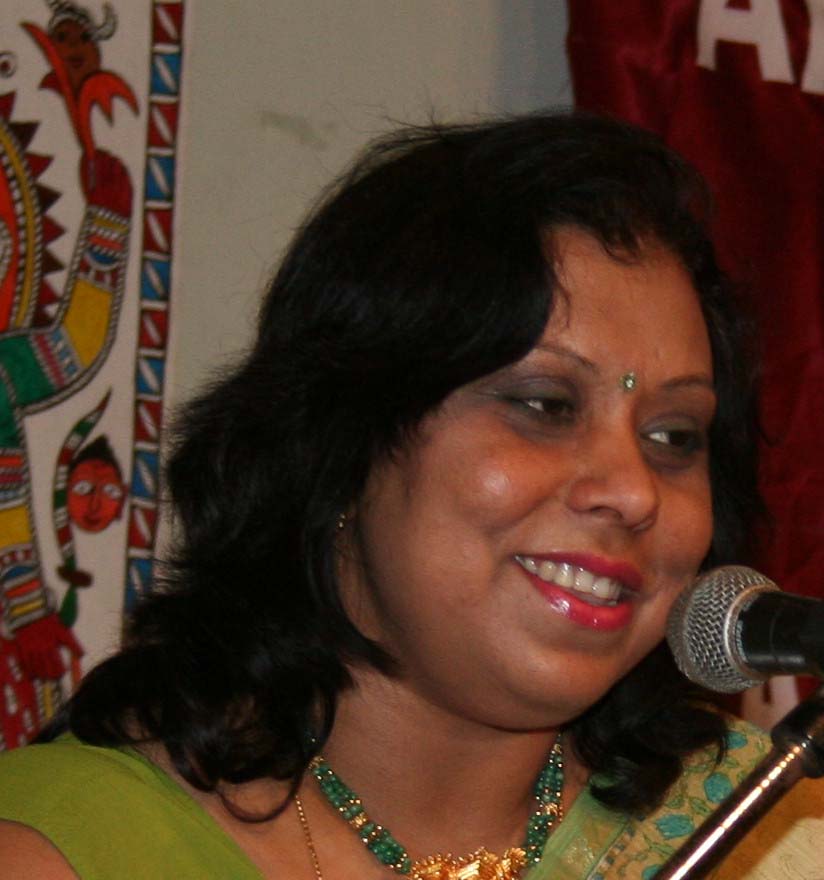
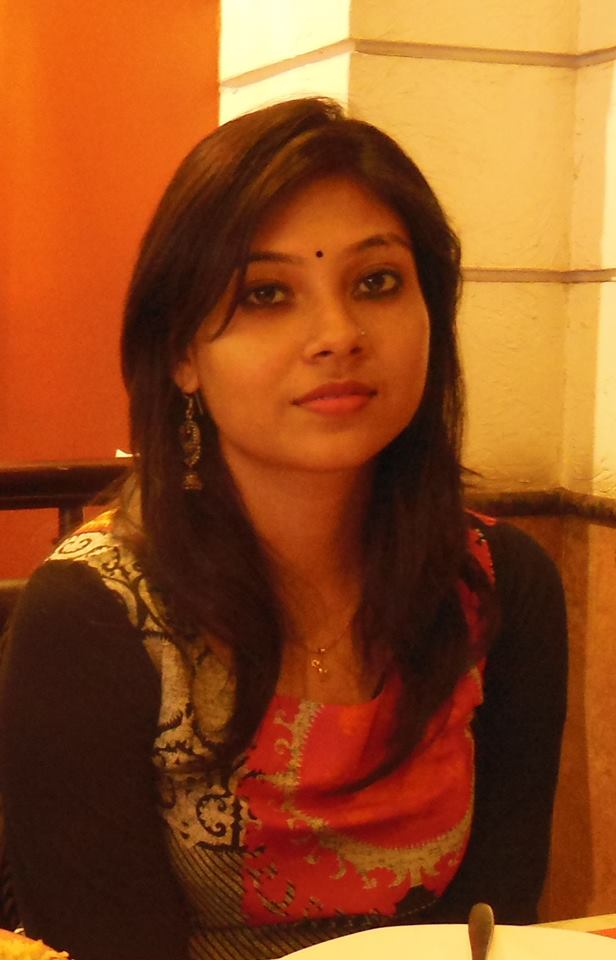 |
Paula Banerjee, the
Honorary Director of the Calcutta Research Group is
an expert on Indo-American relations and studied in
Cincinnati, Ohio. As part of her current work on borders and
women, she has authored numerous papers on women in conflict
situations in northeast India. She is a professor in the
Department of South and South East Asian Studies, University
of Calcutta. She has authored a book on Indo-US relations,
titled When
Ambitions Clash (2003),
and has co-authored a book, Women in Society and Politics
in France. Dr. Banerjee is the recipient of a number of
international fellowships including the Advanced Taft
Fellowship (1991-1993) and has been the recipient of the
WISCOMP Fellow Of Peace Award (2001). Currently she is
working on women in peace movements in South Asia and on
borders and boundaries in the region. She is now the
editorial board member of the Refugee
Watch.
She has authored and edited a number of books. Two of her
most recent publications are The State of being
Stateless: An Account of South Asia (co-edited with Atig
Ghosh and Anasua Basu Ray Chowdhury, 2016), Unstable
Populations, Anxious States: Mixed and Massive Flows in
South Asia (2013).
Sucharita Sengupta is associated with Calcutta
Research Group (CRG). Her research interests pertain to
Forced Migration and Border studies in the context of Asia.
After masters’ in Political Science from the University of
Calcutta, she joined the Calcutta Research Group as a
Research Assistant working on ‘West Bengal-Bangladesh
Borderland: Humanitarian issues’. Under this, she wrote a
paper on women trafficked from Bangladesh incarcerated in
jails of West Bengal, India. This was presented at a
workshop “Interrogating Forced Migration” in March 2015 and
published as “Bordered Lives: Women from Bangladesh behind
bars in India”, La Frontera 35 (2). Her recent
research in CRG focused on the Rohingya refugees as part of
the perilous irregular maritime migrants to the shores of
South East Asian nations like Thailand and Malaysia. In this
work she tried to trace the history and context of such
maritime drives, reasons that allure them to take to the
sea, and also the recent media attention to the phenomenon
generating mass awareness of the issue internationally,
especially in Bangladesh, and to some extent, India. The
recent focus on the plight of the boatpeople on the high
seas therefore, shows the need of a comprehensive research
and continuous advocacy to keep the issue relevant.
Currently she is working on patterns of migration in
Northeast India in wake of the Look East policy of the
Indian government, whether population mobility is impacted
upon by the developmental trajectory of the government in
the region and issues of out migration from Northeast to
the rest of India. In 2016 she co-authored two research
papers on Migration in the Northeast and Refugee Movement in
West Bengal during the decade of 50s. Both these papers were
published in the Policies and Practices Series of the
Calcutta Research Group (77 and 80). Email: sucharita@mcrg.ac.in |
|
|
3. |
Research Topic:
Interwoven Realities: The Interface of Geopolitics and
Geo-economics in Asia |
Abstract |
|
Draft Paper |
| |
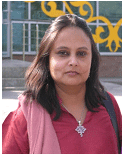 |
Anita Sengupta
is currently Senior Researcher at the Calcutta Research
Group. She is an area studies specialist and her work has
been focused on the Eurasian region with Uzbekistan being
her area of special interest. She has also worked
extensively on Turkish politics. She has collaborated with
scholars in a number of Universities and Institutes in
Tashkent, Bishkek, Almaty, Ankara, Istanbul, Berlin,
Washington and been invited to participate in events
organized in the region. She was part of the Stockholm
International Programme for Central Asian Studies, SIPCAS
and is currently associated with the Nordic
Network for Research on Migration, Identity, Communication
and Security. She is a member of the editorial board
of journals published in Turkey and Kazakhstan and peer
reviews articles for a number of international journals. Her
book Heartlands of Eurasia: The geopolitics of political
space published in 2009 ((Lanham, Boulder, New York,
Toronto, Oxford: Lexington Books) was selected by the Oxford
Bibliographies Online in 2011 as a must read on the section
Geopolitics and Geo-strategy. She is also the author
of Russia, China and Multilateralism in Central Asia,
(New Delhi: Shipra Publications, 2005); The Formation of
the Uzbek Nation-State: A Study in Transition, (Lanham,
Boulder, New York, Toronto, Oxford: Lexington Books, 2003)
and Frontiers into Borders: The Transformation of
Identities in Central Asia, (Delhi and London: Hope
India Publications and Greenwich Millennium Press Ltd,
2002). She has also edited a number of volumes on Eurasian
politics. She is a governing body member of a Track II
organization, India Central Asia Foundation, and has
travelled to the region with this team. She is the author of Myth
and Rhetoric of the Turkish Model: Exploring Developmental
Alternatives
(New Delhi, Heidelberg, New York, Dordrecht, London:
Springer 2014). Her most recent publication is Symbols and the
Image of the State in Eurasia,
published by Springer in 2016. Her research on Connectivity
in Asia has been published in the Policies and Practices
series of Calcutta Research Group (79) in 2016. Email:
anitasengupta@hotmail.com |
|
|
4. |
Research Topic:
Finance Capital and Infrastructure Development: The Asian
Context |
Abstract |
|
Draft Paper |
| |

|
Iman Kumar Mitra did his PhD on the history of
reception and popularisation of the economic discipline in
colonial Bengal from Jadavpur University and the Centre for
Studies in Social Sciences, Calcutta (CSSSC). His research
interests include politics of translation, pedagogy and
category formation in colonial and postcolonial South Asia,
and urban history and migration. His publications include
‘Exchanging Words and Things: Vernacularisation of Political
Economy in Nineteenth-century Bengal’ in the Indian
Economic and Social History Review (Vol. 53, No. 4) and
‘Recycling the Urban: Migration Settlement and the Question
of Labour in Contemporary Kolkata’ in the Economic and
Political Weekly (Vol. LI, Nos. 26 & 27). He has edited
an anthology of essays titled Accumulation in
Postcolonial Capitalism with Ranabir Samaddar and Samita
Sen (Singapore: Springer, 2016). He is currently based at
CSSSC as the ICAS-MP Postdoctoral Researcher. |
|
|
5. |
Research Topic:
The New Silk Road |
Abstract |
|
Draft Paper |
| |
 |
Priya Singh is Research and Programme Associate at
the Calcutta Research Group (CRG). She is an area
specialist and has been tracking the West Asian region with
Israel as an area of special interest. She has been writing
consistently on the issue of migration, displacement and
refugees be it the Palestinian refugees or as in recent
times, the Syrians. Priya has been Fellow at the Maulana
Abul Kalam Azad Institute of Asian Studies, Kolkata from
March 2002-April 2016. Her areas of interest include the
Middle East conflict, state formation in Israel, issues
pertaining to gender, minorities and marginalised
communities such as the Arab Jews, the Bedouins of Negev,
and the Palestinians in Israel. She has authored, edited,
co-edited publications on the region. Her research work has
also been published in peer reviewed journals and as book
chapters. She is a member of the editorial board of the
Journal of Indo-Judaic Studies published by the
International University of Florida Press. As part of her
research, Priya has done extensive fieldwork, be it Tel
Aviv, Jaffa, Jerusalem, Haifa, Beersheba, Ashdod/Ashkelon,
Gaza and the West Bank. She has been part of the prestigious
annual Tel Aviv University (TAU) workshop, which enabled her
to travel extensively in different parts of Israel. In
connection with her project, she has visited Turkey (Ankara
and Istanbul) and has been to Egypt after the protests in
Taksim and Tahrir Square, covering Cairo, Alexandria and
Luxor. She has visited Kabul as part of an academic
delegation to Afghanistan. Priya has attended and made
presentations in several international seminars. As Fellow
at the Maulana Abul Kalam Azad Institute of Asian Studies,
Kolkata, Priya has also been the programme coordinator of
the West Asia programme and has organized various
international seminars in collaboration with and active
participation from the University of Cairo, the American
University of Cairo, the American University of Beirut,
University of Jerusalem, Tel Aviv University, the Ben Gurion
University, the University of Haifa, the Open University of
Israel and the Zirve University, among others. Priya is
proficient in English and Hindi and has a working knowledge
of Bengali, Urdu and Hebrew. She is at present learning
Arabic. |
|
| |
|
|
|
|
Experts |
|
1. |
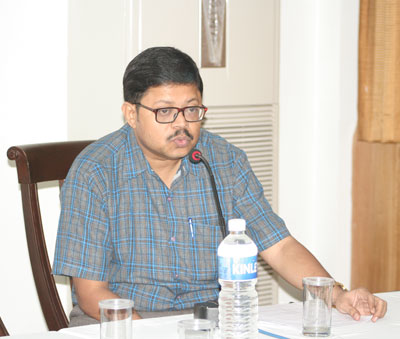 |
Sabyasachi Basu RayChaudhury
is Professor, Vice Chancellor at the RabindraBharati
University, Kolkata. His areas of interest include South
Asian studies, in particular, politics of globalisation,
democracy, development, displacement, human rights and
justice in South Asia. He is among the few experts on the
Andaman and Nicobar Islands that India has. He is a regular
contributor to academic journals, periodicals, dailies, news
channels and portals. His recent publications include:
Indian Autonomies: Key Words and Key Texts, (co-edited
with RanabirSamaddar and Samir Kumar Das), Sampark, Kolkata,
2005, and Internal Displacement in South Asia: The
Relevance of UN’s Guiding Principles, (co-edited with
Paula Banerjee and Samir Kumar Das), Sage Publications, New
Delhi, 2005. His e-mail is
sbrc.rbu@gmail.com |
Comments |
|
2. |
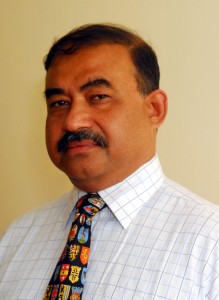 |
Subir Bhaumik, former BBC's
bureau chief (East-Northeast India) , is now senior editor
with Dhaka-based
bdnews24.com
and consultant editor with Myanmar’s Mizzima News. He has
worked for Reuters and Time magazine, Press Trust of India
and Ananda Bazar group. He has been a Queen Elizabeth House
fellow at Oxford University(1989-90) , a fellow at East-West
Center , Washington ( 2004) and Eurasian-Nets fellow at
Frankfurt University (2009). He is the author of
Insurgent Crossfire: Northeast India and Troubled
Periphery: Crisis of India’s Northeast and has edited
Living on the Edge and Counter-Gaze: Media,Migrants,
Minorities. He writes regular columns on regional
issues and defence and security for leading Indian dailies
like Telegraph, Times of India, the Hindu and Economic Times
and does special features for BBC and Al Jazeera Online. He
is closely associated with the Track 2 Kolkata-Kunming
(K2K) process involving Indian and Chinese border states
and is a member of the Calcutta Research Group.
Email:
sbhaum@gmail.com |
Comments |
|
3. |
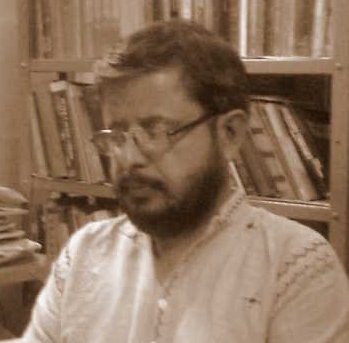 |
Sibaji Pratim Basu of
Department of Political Science with Rural Administration at
Vidyasagar University, Midnapore, West Bengal (India), is a
senior teacher, researcher and author in the field of a wide
range of subjects in social science. Professor Basu has
graduated from the Department of Political Science,
Presidency College, Kolkata (1981); post-graduated from
University of Calcutta (1983) and obtained Ph.D. on “The
Concepts of Nationalism and Internationalism: Tagore and
Gandhi”, from Calcutta University (2005).
He taught Political Science at Sree Chaitanya College,
Habra, West Bengal for three decades and also worked as the
Guest faculty at Post Graduate Departments of Political
Science at University of Kalyani (1987-2006) and Netaji
Subhas Open University, WB (2003-09). For more than a
decade, since 2001, he had delivered Special Lectures on
“Cultural Politics” at Rabindra Bharati University.
He has acted as Resource Person during Refresher Courses and
pre-Ph.D. courses at various universities, including
University of Calcutta. He has presented papers and chaired
sessions at different national and international
conferences/seminars. A regular contributor to academic
journals/books and popular dailies, periodicals, Professor
Basu often appears on various channels as political
commentator. He specialises in Modern Indian Political
Thought & Politics, Socialist Thought and also has serious
interest in the issues related to forced migration in
contemporary South Asia and people’s ‘sustainable rights’ in
India. |
Comments |
|
4. |
 |
Swaran Singh
is Professor of Disarmament Studies at the Centre for
International Politics, Organisation and Disarmament (CIPOD),
School of International Studies, Jawaharlal Nehru University
(New Delhi). He is President of Association of Asia
Scholars, General Secretary of Indian Association of Asian &
Pacific Studies, Visiting Professor, China West Normal
University and Guest Professor at Research Institute of
Indian Ocean Economies (RIIO), Yunnan University of Finance
and Economics (China), and Advisory Board Member of
Atlanta-based Communities Without Borders Inc. He was Chief
Vigilance Officer of his University (2012-15) and External
Member to its Centre for East Asian Studies of JNU. Prof
Singh has 25 years of experience in research and teaching
and lectures at major institutions like National Defence
College, Defence Services Staff College, and all other major
military institutions as also Foreign Service Institute,
Indian Institute for Public Administration etc. as also
contributes to radio and television discussions. His most
recent research article on "State of India's Security
Studies" published in recent issue of Millennial Asia
(Sage, Sept-Nov 2015) at
http://www.jnu.ac.in/Faculty/ssingh/State_of_Security.pdf
Prof Singh travels and writes extensively on Asian Affairs,
China’s foreign and security policy issues with special
focus on China-India confidence building measures as also on
Arms Control and Disarmament, Peace and Conflict Resolution,
India’s foreign and security policy issues. He has
co-edited BCIM Economic Corridor Chinese and Indian
Perspectives (Adroit 2017), Transforming South Asia:
Imperatives for Action (2013); India and the GCC Countries,
Iran and Iraq: Emerging Security Perspectives (2013), On
China By India: From Civilization to State
(Cambria 2012),
Emerging China: Prospects for Partnership in Asia
(Routledge 2012), Asia’s
Multilateralism
(in Chinese, 2012) published from Shanghai; Edited
China-Pakistan Strategic Cooperation: Indian Perspectives
(2007) Co-authored Regionalism in South Asian Diplomacy
(SIPRI Policy Paper No. 15, February 2007) and authored
Nuclear Command & Control in Southern Asia: China, India,
Pakistan (2010), China-India Economic Engagement:
Building Mutual Confidence (2005), China-South Asia:
Issues, Equations, Policies (2003), China’s Changing
National Security Doctrines (1999) and Limited War:
The Challenge of US Milit
PAGE 11ary Strategy
(1995). His e-mail is
swaransingh@hotmail.com |
Comments
Comments |
|
5. |
 |
Sharmistha Banerjee
is a Professor of Business Management at the University of
Calcutta. She has a Bachelor and Master’s degree of
Commerce, a bachelor degree in Education, certificate MBA
from Rollins College, USA and PhD in Business Management
from the University of Calcutta. She is an all India topper
and Fellow of the Institute of Cost & Management Accountants
of India. Her teaching areas include Management, HRM, OB and
Entrepreneurship. Her research areas include Small Business
Management, Microfinance and Entrepreneurship, Human
Resource Management, OB, Public Policy and Development,
Environmental Management and Children and Women’s Issues.
Under her mentorship, a number of students have earned their
PhD degrees. As part of various research projects she has
worked on national and international projects dealing with
children and women issues, public policy, environmental
issues, and recently in the field of microfinance. Dr.
Banerjee is an active contributor and editor for several
prestigious research publications and international
journals.
She received the Global Links scholarship promoted by the US
department of State for Global Women’s Issues in 2015, a
Fulbright Scholarship in 2005 to be a visiting faculty at
Bloomsburg University, Pennsylvania and then in 2012,
Fulbright Scholar in Residence at Moreno Valley College in
California. In 2006, she served as visiting faculty in BRAC
University in Dhaka, Bangladesh. She was a visiting faculty
member at the SolBridge International School of Business,
Woosong University in Daejeon, South Korea. In 2009 she was
resource focal point of Research on Violence against
Children in Kenya, in Nairobi and Mombasa, supported by
IREWOC, University of Amsterdam and Plan Kenya.
She has, for other short term academic interactions
travelled to Sweden, Germany, Switzerland, Turkey, China,
Indonesia, Mexico. Her e-mail is
sharmisthabanerjee@hotmail.com |
Comments |
|
6. |
 |
Sujata Ashwarya is
an Assistant Professor in the Centre for West Asian Studies,
JamiaMilliaIslamia. She studied for an honours degree in
Political Science at the Lady Shri Ram College in University
of Delhi. She then did an MA in International Politics at
the School of International Studies in Jawaharlal Nehru
University, New Delhi, and later received MPhil and PhD
degrees from the same university. She was awarded the
Government of Israel Graduate Fellowship (2002-03) and
Visiting Research Fellowship (2011-12) to carry out research
at Hebrew University of Jerusalem. She was also awarded the
Hermes Post-Doctoral Fellowship (2007) at Maison des
Sciences de l’Homme (MSH) and Centre d’Etudeset des
RecherchesInternationales (CERI), Paris. She was a Visiting
Fellow at the MSH (June 2009) under the Indo-French Cultural
Exchange Programme. Her research interests conflicts in West
Asia, India’s relations with different countries of the West
Asian region, India’s West Asia policy, politics and foreign
policy of Iran, Iraq and Israel, and issues relating to
democratization in the region. Currently, she teaches four
courses: (i) West Asia and international Relations; (ii) The
Dynamics of the Arab-Israeli Conflict; (iii) Israel:
Politics and Society and (iv) Introduction to West Asia
(shared). Her e-mail is
sujata.aishwarya@gmail.com |
Comments |
|
7. |
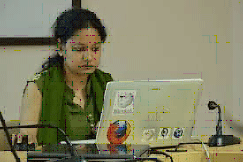 |
Arpita Basu Roy is
Senior Fellow and Member, Academic Committee, at the Centre
for Studies in International Relations and Development (CSIRD),
Kolkata. She holds a Ph.D. degree awarded by the Department
of International Relations, Jadavpur University, Kolkata on
the theme: “Consequences and Challenges of the
Afghan Conflict: Situating Workable Response”. She has
been working on Central and South Asia, with Afghanistan
being the area of her specific interest. She is the
recipient of the 10th Wrangler Pavate Fellowship for
International Studies (2010) awarded by the Pavate
Foundation at the Department of Politics and International
Studies (POLIS), University of Cambridge where she worked on
a project entitled Alternative
Paradigms of Security in International Relations Theory and
Its Relevance To South
Asia. She is a former Fellow at the MaulanaAbulKalam
Azad Institute of Asian Studies (MAKAIAS), Kolkata. She is
well-known as an expert on Afghan Studies and International
Relations and has represented her country in several
international fora and track 2 initiatives both in and
outside the country. She has contributed articles on
population movement, gender issues, problems of transitional
politics and regional cooperation to several research
journals, edited books and encyclopaedia. She is a Visiting
Faculty at the various Universities in West Bengal in
courses dealing with contemporary politics/South Asia and
International Relations and has also supervised M.Phil
students. She has also written editorial articles in major
national dailies and has made several media appearances on
issues related to international and national security. Her
e-mail is
basuroyarpita@gmail.com |
Comments |
|
8. |
 |
Anjan Chakrabarti is currently Professor of
Economics, University of Calcutta. Additionally, he holds
the honorary position of Secretary, Institute of Development
Studies, Kolkata and is associated with colleges and other
universities in different capacities. He is the recipient of
Dr V K R V Rao Prize in Social Science Research in Economics
for the year 2008. His interests include Marxian Theory,
Political Philosophy, Development Economics/Studies and
Indian Economics. Along with Macroeconomics, he teaches
Economics of Marx and Political Economy of Development at
the MSC and MPHIL/PHD level. He has to his credit 7 books
and published over 50 articles in edited books and academic
journals. Among his published books are ‘Transition and
Development in India’ (co-authored with Stephen Cullenberg),
‘Dislocation and Resettlement in Development: From Third
World to World of the Third’ (co-authored with AnupDhar),
both from Routledge and ‘World of the Third and Global
Capitalism” (co-authored with AnupDhar and Stephen
Cullenberg) from Worldview Press. He has recently published
‘The Indian Economy in Transition: Globalization, Capitalism
and Development (co-authored with AnupDhar and
ByasdebDasgupta) from Cambridge University Press. His
publication spans journals such as Cambridge Journal of
Economics, Collegium Anthropologicum, Critical Sociology,
Rethinking Marxism,Psychotherapy and Politics International,
and Economic and Political Weekly. He is also a member of
the editorial board of the journal Rethinking Marxism.
E-Mail:
chakanjan@hotmail.com |
Comments |
|
9. |
 |
Atul
Mishra
is Assistant Professor at the Department of International
Relations and Governance Studies, Shiv Nadar University. His
research areas include International Relations (IR)
theories, international relations of modern South Asia,
modern Indian international thought, contemporary Indian
foreign policy and Asian international relations. Much of
his work seeks to combine history, theory and policy. His
work has been published in the Economic and Political
Weekly, Strategic Analysis, International
Studies, South Asian Survey and Studies in
Indian Politics. He co-authored (with Rajesh Rajagopalan) Nuclear
South Asia: Keywords and Concepts (Routledge, 2014) and
writes occasionally for the popular press. He was part of a
recently-completed major project on India’s regional
relations, which was sponsored by the ICSSR.
Email: atul.mishra@snu.edu.in |
Comments |
|
10. |
 |
Rakhee Bhattacharya
is currently an Associate Professor at North East India
Studies Programme, Jawaharlal Nehru University. She was an
Endeavour Post doctoral fellow in Australia and has worked
and taught in other institutes across the country. Her
research interests are development economics, regional
economy, poverty and inequality, security issues, India’s
Northeast and its neighbourhood. She has authored Development
Disparities in Northeast India (Cambridge University
Press, 2011) and Northeastern India and its Neighbours:
Negotiating Security and Development (Routledge, 2014).
In addition to this she has edited a number of volumes and
has written many articles in both national and international
journals. Her latest edited volume is Regional
Development and Public Policy Challenges in India(Springer,
2015)
E mail:
rakhee_2k@hotmail.com |
Comments |
|
11. |
 |
Pradip Phanjoubam
is the founder editor of Imphal Free Press, Imphal. He is
the author of two books. The Northeast Question:
Conflicts and frontiers (Routledge India, January 2016)
which delves into the meta narratives of geography and
geopolitics which determined the politics and psychology of
India’s Northeast region and Shadow & Light: A
Kaleidoscope of Manipur (Hachette India, November 2016)
which is a portrait of Manipur, its trials and tribulations,
successes and failures. This work was commissioned by the
Indian National Trust for Art and Cultural Heritage, INTACH.
Phanjoubam has worked for a number of dailies before
deciding to start the Imphal Free Press in 1996. He
began his career with the Times of India, New Delhi after
completing a 9-month diploma course in journalism from the
Times Research Foundation for Social Journalism in 1986; He
left the TOI in 1989 to join Business and Political
Observer, New Delhi; In 1990 he left the BPO to start an
independent features agency based in Guwahati called “Orient
Features”; he wound up the agency after four years to
returned to his hometown, Imphal and join The Telegraph,
Kolkata as its Imphal correspondent. He still writes opinion
pieces for a number of publications, including Economic
and Political Weekly, The Hindu, Indian
Express, The Times of India, Economic Times, The Asian Age,
besides several web journals, on request. In 1994-1995 he
received the KK Birla Foundation Fellowship to write a
monograph on “Sub-nationalism in the Northeast”. During
2012-2024, he was resident fellow of the Indian Institute of
Advanced Study, Shimla. His research work during the IIAS
fellowship resulted in his first mentioned book. He has also
contributed chapters for several edited essay anthologies,
including in Sanjib Baruah edited Beyond
Counterinsurgency: The impasse in Northeast India(OUP
2009), and Geeti Sen edited Where the Sun Rises when
Shadows Fall: The Northeast(OUP 2005). E-mail:phanjoubam@gmail.com |
Comments |

Researchers & Experts 2016
|
Sl. No. |
Picture |
Bio Note |
|
|
Researchers |
|
1. |
Research Topic:
Resources and Infrastructure in the Northeast
&
India’s Look East and Act East Policy |
Abstract |
|
Draft Paper |
| |
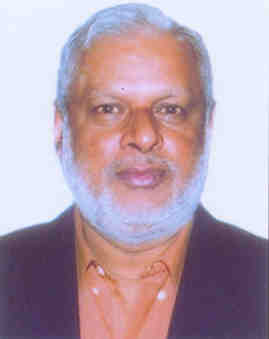
 |
Ranabir Samaddar is
the
Distinguished Chair in Migration and Forced Migration
Studies
of the Calcutta Research Group, and belongs to the school of
critical thinking. He has pioneered along with others peace
studies programmes in South Asia. He has worked extensively
on issues of justice and rights in the context of conflicts
in South Asia. The much-acclaimed The Politics of Dialogue (Ashgate,
2004) was the culmination of his work on justice, rights,
and peace. His particular researches have been on migration
and refugee studies, the theory and practices of dialogue,
nationalism and post-colonial statehood in South Asia, and
new regimes of technological restructuring and labour
control. He authored a three-volume study of Indian
nationalism, (Whose Asia Is It Anyway – nation and The
Region in South Asia, 1996, The Marginal Nation –
Transborder Migration from Bangladesh to West Bengal, 1999,
and A Biography of the Indian Nation, 1947-1997, 2001). His
recent political writings published in the form of a 2
volume account, The Materiality of Politics (Anthem Press,
2007), and the just published The Emergence of the Political
Subject (Sage, 2009) have challenged some of the prevailing
accounts of the birth of nationalism and the nation state,
and have signalled a new turn in critical post-colonial
thinking. Email
: ranabir@mcrg.ac.in
Snehasish
Mitra
He is a Research Assistant in Calcutta Research Group (CRG).
He completed his masters in the discipline of 'Ecology,
Environment and Sustainable Development' from the Tata
Institute of Social Sciences, Guwahati, Assam (India). His
masters dissertation focussed on the issues surrounding the
settlements on the hills of Guwahati, mainly through legal
and environmental paradigms. He has worked as a Research
Assistant in a project supported by Stockholm University
(Sweden) which aimed to understand the phenomenon of labour
migration from Northeast India to other parts of India and
into the wider global network. His reserach interests are -
migration, urban studies, environmental justice and
political ecology. In 2016 he worked on India's Look East
Policy with specific focus on Northeast India which resulted
in a co-authored publication with Ranabir Samaddar titled
'Bridge of Spaces: East by Northeast, Ah! The Northeast'.
(Policy and Practices, 76) Email: snehashish@mcrg.ac.in |
|
2. |
Research Topic:
Bangladesh: The Key to India’s Look East |
Abstract |
|
Draft Paper |
| |
 |
Subir Bhaumik, former BBC's
bureau chief (East-Northeast India) , is now senior editor
with Dhaka-based
bdnews24.com
and consultant editor with Myanmar’s Mizzima News. He has
worked for Reuters and Time magazine, Press Trust of India
and Ananda Bazar group. He has been a Queen Elizabeth House
fellow at Oxford University(1989-90) , a fellow at East-West
Center , Washington ( 2004) and Eurasian-Nets fellow at
Frankfurt University (2009). He is the author of
Insurgent Crossfire: Northeast India and Troubled
Periphery: Crisis of India’s Northeast and has edited
Living on the Edge and Counter-Gaze: Media,Migrants,
Minorities. He writes regular columns on regional
issues and defence and security for leading Indian dailies
like Telegraph, Times of India, the Hindu and Economic Times
and does special features for BBC and Al Jazeera Online. He
is closely associated with the Track 2 Kolkata-Kunming
(K2K) process involving Indian and Chinese border states
and is a member of the Calcutta Research Group.
Email:
sbhaum@gmail.com |
|
|
3. |
Research Topic:
Interrogating Migration in India’s Northeast |
Abstract |
|
Draft Paper |
| |
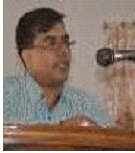
 |
Samir K. Purkayastha
is an independent writer and journalist based in Kolkata. He
has worked in various capacities in The Telegraph, The
Asian Age, The Sentinel, The Seven Sisters Post, The
Nagaland Page and the Nagaland Observers. He has written
several scholarly articles in journals and books. Some of
his publications include UID’s Augean Task? Assam and the
Illegal Migrants and The Consequences of Long Term
Conflicts in Northeast India: Impact on Assam. Mizoram,
Meghalaya and Tripura.
Email:
samirpurkayastha@gmail.com
Sucharita Sengupta is associated with Calcutta
Research Group (CRG). Her research interests pertain to
Forced Migration and Border studies in the context of Asia.
After masters’ in Political Science from the University of
Calcutta, she joined the Calcutta Research Group as a
Research Assistant working on ‘West Bengal-Bangladesh
Borderland: Humanitarian issues’. Under this, she wrote a
paper on women trafficked from Bangladesh incarcerated in
jails of West Bengal, India. This was presented at a
workshop “Interrogating Forced Migration” in March 2015 and
published as “Bordered Lives: Women from Bangladesh behind
bars in India”, La Frontera 35 (2). Her recent
research in CRG focused on the Rohingya refugees as part of
the perilous irregular maritime migrants to the shores of
South East Asian nations like Thailand and Malaysia. In this
work she tried to trace the history and context of such
maritime drives, reasons that allure them to take to the
sea, and also the recent media attention to the phenomenon
generating mass awareness of the issue internationally,
especially in Bangladesh, and to some extent, India. The
recent focus on the plight of the boatpeople on the high
seas therefore, shows the need of a comprehensive research
and continuous advocacy to keep the issue relevant.
Currently she is working on patterns of migration in
Northeast India in wake of the Look East policy of the
Indian government, whether population mobility is impacted
upon by the developmental trajectory of the government in
the region and issues of out migration from Northeast to
the rest of India. In 2016 she co-authored two research
papers on Migration in the Northeast and Refugee Movement in
West Bengal during the decade of 50s. Both these papers were
published in the Policies and Practices Series of the
Calcutta Research Group (77 and 80). Email: sucharita@mcrg.ac.in |
|
|
4. |
Research Topic:
Kolkata as a Logistical Hub with Special Reference to the
Kolkata Port |
Abstract |
|
Draft Paper |
| |
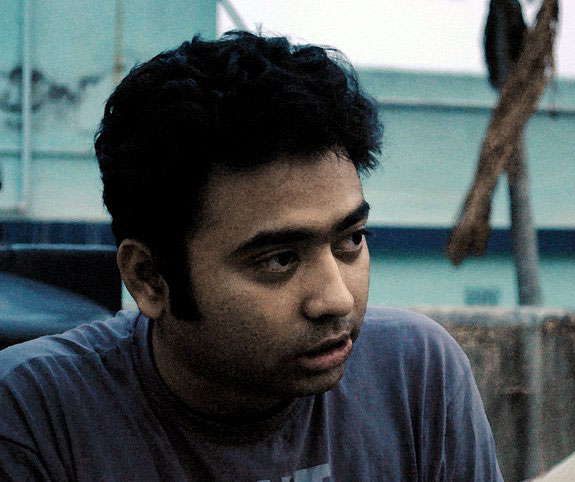
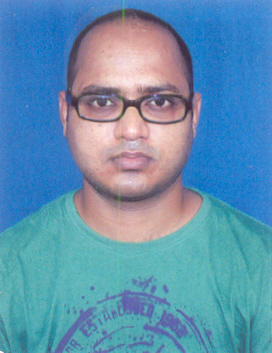 |
Iman Mitra
is presently a Research and Programme Associate at
Mahanirban Calcutta Research Group. He has registered with
Jadavpur University as an ICSSR Doctoral Fellow for his PhD
in 2009 and submitted his thesis for examination in 2013.
His PhD dissertation explores the history of dissemination
of economic knowledge in colonial Bengal through various
pedagogical and institutional networks. His research
interests include modes of popularization of the discipline
of economics in colonial and post-colonial India and the
appropriation of and negotiations with disciplinary
knowledge at the level of practical application. At MCRG, He
is involved in a project on the interconnectedness between
rural to urban migration, urbanization,and social justice in
post-liberalization India. He has also contributed in many
Bengali and English dailies on issues of political and
social import. Email:
imanmitra@gmail.com
Mithilesh Kumar
is a PhD Candidate at Western Sydney University,
Australia. His dissertation tries to understand the
evolution of new forms of governance, sovereignty and labour
processes and politics in the context of infrastructure. He
studied Delhi airport for his thesis. He has earlier worked
on logistics of migration, disaster management and
governance in Bihar. His interest is in the issues of
logistics, migration and labour and politics. He is now
currently working on the dialogic relationship between the
nature, evolution and innovation of the Indian state with
social and political movements in India. He
is the author of
"Governing Flood, Migration and Conflict in North Bihar." Government
of Peace Social Governance, Security and the Problematic of
Peace. Ed. Ranabir Samaddar. London: Ashgate, 2015 and
“Statistics , Public-Private Partnership and the Emergence
of a New Subject.” Accumulation in Postcolonial Capitalism,
Ed. Ranabir Samaddar, Samita Sen, and Iman Kumar Mitra,
Singapore: Springer, Forthcoming.
Email:
kmithilesh@hotmail.com |
|
|
5. |
Research Topic:
Being
Connected
Logistic Visions to the East and West of India |
Abstract |
|
Draft Paper |
| |
 |
Anita Sengupta
is currently Senior Researcher at the Calcutta Research
Group. She is an area studies specialist and her work has
been focused on the Eurasian region with Uzbekistan being
her area of special interest. She has also worked
extensively on Turkish politics. She has collaborated with
scholars in a number of Universities and Institutes in
Tashkent, Bishkek, Almaty, Ankara, Istanbul, Berlin,
Washington and been invited to participate in events
organized in the region. She was part of the Stockholm
International Programme for Central Asian Studies, SIPCAS
and is currently associated with the Nordic
Network for Research on Migration, Identity, Communication
and Security. She is a member of the editorial board
of journals published in Turkey and Kazakhstan and peer
reviews articles for a number of international journals. Her
book Heartlands of Eurasia: The geopolitics of political
space published in 2009 ((Lanham, Boulder, New York,
Toronto, Oxford: Lexington Books) was selected by the Oxford
Bibliographies Online in 2011 as a must read on the section
Geopolitics and Geo-strategy. She is also the author
of Russia, China and Multilateralism in Central Asia,
(New Delhi: Shipra Publications, 2005); The Formation of
the Uzbek Nation-State: A Study in Transition, (Lanham,
Boulder, New York, Toronto, Oxford: Lexington Books, 2003)
and Frontiers into Borders: The Transformation of
Identities in Central Asia, (Delhi and London: Hope
India Publications and Greenwich Millennium Press Ltd,
2002). She has also edited a number of volumes on Eurasian
politics. She is a governing body member of a Track II
organization, India Central Asia Foundation, and has
travelled to the region with this team. She is the author of Myth
and Rhetoric of the Turkish Model: Exploring Developmental
Alternatives
(New Delhi, Heidelberg, New York, Dordrecht, London:
Springer 2014). Her most recent publication is Symbols and the
Image of the State in Eurasia,
published by Springer in 2016. Her research on Connectivity
in Asia has been published in the Policies and Practices
series of Calcutta Research Group (79) in 2016. Email:
anitasengupta@hotmail.com |
|
| |
|
|
|
|
Experts |
|
1. |
 |
Sanjay Barbora
is currently working as an Associate Professor at
TISS’ Guwahati campus. Research interests include agrarian
change, resource conflicts, media studies and human rights.
Having worked as a human rights activist on issues
pertaining to militarization of Northeast India, I managed
an advocacy and research based media initiative on peace
building in South Asia from 2005 to 2011. Other than my
stated academic interests, I continue to be energized by my
involvement in community media and radio journalism, as well
as the democratization of public spheres. Email:
xonzoi.barbora@gmail.com |
Comments
Comments |
|
2. |
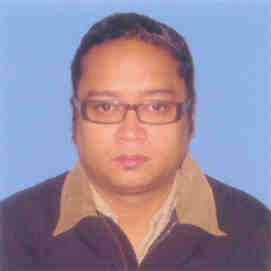 |
Atig Ghosh
is
Assistant Professor of History, Visva-Bharati, Santiniketan.
He has taught history on a part time basis at the West
Bengal State University (Barasat). Having studied history at
the Presidency College and Jawaharlal Nehru University, he
received his doctoral degree from El Colegio de Mexico,
Mexico City. His doctoral research was lodged around
conjoint concerns of political economy and cultural
anthropology in the context of small town (mofussil) Bengal
in the nineteenth century. He has researched statelessness
and its socio-ontological textures and tangles in the
intractable fastness of the Indo-Bangladesh enclaves.
Email:
atigghosh@gmail.com
|
Comments |
|
3. |
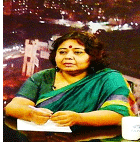 |
Meghna Guhathakurta
is executive director of Research Initiatives Bangladesh
(RIB), a research support organization based in Dhaka, which
specializes in action research with marginalized
communities. From 1984 to 2007, she taught International
Relations at the University of Dhaka. Her field of
specialization has broadly been international development,
gender relations, and South Asian politics. She is widely
published on these issues. She serves as associate editor of
the Journal of Social Studies published from the
Centre for Social Studies in Dhaka. She is advisor to the
International Chittagong Hill Tracts Commission, an advocacy
watchdog, and has been project coordinator of RIB’s project
in the official Rohingya camps as implementing partner of
UNHCR from 2011-2014 Guhathakurta
graduated from the University of Dhaka and received her
Ph.D. Politics from the University of York, United Kingdom.
Email:
meghna.guhathakurta@gmail.com |
Comments |
|
4. |
 |
Ritajyoti Bandyopadhyay
is
Assistant Professor, Indian Institute of Science, Education
and Research, Mohali. He has been Postdoctoral
Fellow/Lecturer, State and Democracy Research Group, Centre
for Modern India Studies, University of Gottingen (October,
2012-July, 2013)
Postdoctoral Associate, Urban Research and Policy
Programme, NIAS, Bangalore (November, 2010-September, 2012).
He did his PhD in History (Jadavpur University/
Centre for Studies in Social Sciences, Calcutta, India, and
partly at Department of Sociology, University of California,
Berkeley)
He has a post doctoral Fellowship at National Institute
of Advanced Studies, Indian Institute of Science, Bangalore.
2009 – 2010: Fulbright-Nehru
Doctoral-and-Professional-Research-Fellowship, housed by
University of California, Berkeley, USA.
2006 – 2009: Sasakawa Young Leaders’ Fellowship
Fund Doctoral Fellowship, housed by the Department of
History, Jadavpur University, Calcutta, India.
2008: SYLFF-FMP Doctoral Visiting Fellowship,
housed by El Colegio de Mexico, Mexico City, Mexico. He is
the author of The Rule of the Street: Institutions and
Informality in Calcutta in the Long Twentieth Century,
Cambridge University Press, (Under Contract). Email:
ritajyoti@gmail.com |
Comments
Comments |
|
5. |
 |
Binoda Kumar Mishra
is director of Centre for Studies in International Relations
and Development (CSIRD). The Centre is a non-profit
organisation involved in research in International Relations
and Development issues. His personal research area is
security studies that include the emerging traditional and
non-traditional security scenarios in South and Southeast
Asia, regionalism, and Indian Foreign Policy. He is also
interested in “Diaspora” studies. He completed my Ph.D. in
Disarmament and Strategic Studies from Jawaharlal Nehru
University, New Delhi, India. The title of the PhD Thesis is
“Evolution and Working of the Convention on Certain
Conventional Weapons (CCW).” The title of the M.Phil
Dissertation is “Abolishing Nuclear Weapons: A Survey of
Proposals and their Prospects.” Taught
graduate students at Panchakot Mahavidyalaya, Burdwan
University, West Bengal, from May 2003 – December 2005 as a
regular faculty. He has presented papers on, India’s Foreign
Policy, Nuclear Politics, Regional Institutional
Arrangements in various national and international seminars.
Email:
bkmishra27@gmail.com |
Comments |
|
6. |
 |
Debarati Bagchi
is a Transnational Research Group (Max Weber Foundation)
Postdoctoral Fellow based at the Jawaharlal Nehru
University. Her postdoctoral research studies the print and
proliferation of SylhetNagri script in colonial
Sylhet-Cachar region. She completed her doctoral
dissertation from the University of Delhi and Centre for
Studies in Social Sciences, Calcutta in 2015. Her doctoral
work was on Many Spaces of Sylhet: Making of a “Regional
Identity”, 1870s-1940s.Debarati completed her B.A. and
M.A. in History from Jadavpur University. In 2014, she had
been associated with the Mahanirban Calcutta Research Group
as Research Associate and has contributed to the project on
‘Cities, Rural Migrants and Urban Poor’. Debarati had also
been associated with the British Library Endangered Archives
Programme funded project on the archiving of SylhetNagri
texts at the School of Cultural texts and Records, Jadavpur
University, during 2005-07.
Email:
bagchidebarati@gmail.com |
Comments |
|
7. |
 |
Anandaroop Sen
has completed his PhD Centre for Historical Studies (CHS),
Jawaharlal Nehru University (August 2016). He has worked at
CHS with
Professor Neeladri Bhattacharya.
At present he teach as a guest
lecturer in the Sociology department at Presidency
University, Kolkata (from January 2016).His
thesis titled ‘Tales
of Territoriality, Practices of Region Making: North Eastern
Frontier of Colonial India c.1761-1895’
looks at
production of ‘frontiers’ under a sign of ‘other spaces’. In
the dissertation he look at how this region has been
historically produced as a violent and other space.
Introduced by colonialism, persistent in post independent
India, this idea of another space has been entrenched
through ‘exceptional’ legislations. The thesis maps these
processes. At a conceptual level it probes the relationship
between violence, law and exceptional spaces. His particular
expertise concerns the sub-regions of British Tippera (Tripura
State) and the Lushai (Mizoram state), Chittagong Hill
Tracts ( Bangladesh), Rakhine or Arakan region (Myanmar)
Chin Hills (Myanmar) all of which have long been neglected
in the mainstream histories of South Asia. His areas of
interest are as follows: Emergency Laws, Law and Society,
Histories of Capital, Historical Anthropology, Analytics of
the Primitive, Bio-politics, Histories and Theories of
Frontier, Violence and Law.
Email:
anandaroopsen@gmail.com |
Comments |
|
8. |
 |
Gurudas Das
is currently Professor at the National Institute of
Technology (NIT), Silchar, Assam. Earlier, he had worked in
North Eastern Hill University (NEHU), Shillong, as a Reader
in Economics; AmiyaKumar Das Institute of Social Change and
Development (OKDISCD), Guwahati, as a Research Fellow; and
St Anthony’s College, Shillong, as a Lecturer in Economics .
He graduated from ABN Seal College, Coochbehar and later did
his Masters and Ph D from the University of North Bengal,
Siliguri, West Bengal. For last 25 years, he has been
working and writing on the society, economy and polity of
India’s Northeast. He has pioneered studies on border trade
and advocated to use cross-border trade and sub-regional
cooperation as strategies for the development of the
bordering regions in North East India. His book on
Security and Development in India’s Northeast (OUP,
2012) and co-authored and co-edited volume on Look East
to Act East: Implications for India’s Northeast (Routledge,
2016) have received wide acclamation. He is widely published
and traveled in and outside the country. Besides teaching
and social research, he also provides consultancy services
to a number of research and business organizations in the
country. He has been nominated, as a member, to different
academic and research bodies in and outside the region. He
is the founder of Society for North East Development
Studies (SNEDS) and editor of The Social Scanner.
He is currently working on a compilation on BCIM:
Interplay of Geo-politics and Geo-economics.
Email:
gurudas_das@yahoo.co.in |
Comments |
|
9. |
 |
Sanjay Chaturvedi
is Professor of Political Science at Panjab University,
Chandigarh, India. He specializes in the theory and
practices of geopolitics; with special reference to Polar
Regions and the Indian Ocean Region. His current area of
research is geopolitics of climate change. He is recipient
of several visiting professorships and fellowships abroad
including Curtin University, Australia; University of
Wurzburg, Germany; India-China Institute, The New School,
USA; The University of Adelaide, Australia; University of
Cambridge, England; University of Durham, UK;
Institute of Southeast Asian Studies (ISEAS)-YusofIshak
Institute, Singapore (2010-2012),
Columbia University
Institute for Scholars, Paris; Faculty of Law, University of
Sydney; Ben Gurion University of the Negev, Israel; and
Henry L. Stimson Centre, Washington D.C., USA.
Chaturvedi is the founding Vice-Chairman of Indian Ocean
Research Group (IORG), which has Observer Status under the
Indian Ocean Rim Association (IORA). He has also been a
member of the Steering Committee of International
Geographical Union (IGU) Commission on Political Geography
(2004-2012) and the Co-Chair of Research Committee 15 (RC
15) on Political and Cultural Geography of International
Political Science Association (IPSA): 2006-2012. Chief
Editor of Panjab University Research Journal (Social
Sciences), Chaturvedi, he is the co-editor of Journal of
the Indian Ocean Region (Routledge) and the Regional
Editor of The Polar Journal (Routledge). He also
serves on the international editorial/advisory board of
Geopolitics (Routledge), Co-operation and Conflict
(Sage), Journal of Global Faultlines (Pluto) and
The Journal of Borderland Studies (Routledge).Chaturvedi’s
most recent co-authored books are: Climate Terror: A
Critical Geopolitics of Climate Change (Palgrave
Macmillan 2015) and Climate Change and the Bay of Bengal:
Emerging Geographies of Hope and Fear (Institute of
South East Asian Studies, Singapore). His forthcoming books
include co-authored: Rise and Return of Indo-Pacific
(Oxford University Press, 2017) and co-edited:
Environmental Sustainability from the Himalaya to the
Oceans: Struggles and Innovations in China and India
(Springer, October 2016). He
has also been a Visiting Speaker at the National Defence
College and Foreign Service Institute, New Delhi. He has
visited 46 countries in connection with various academic
assignments. Email:
csgiorg@gmail.com |
Comments |
|
10. |
 |
Pradip Phanjoubam
is the founder editor of Imphal Free Press, Imphal. He is
the author of two books. The Northeast Question:
Conflicts and frontiers (Routledge India, January 2016)
which delves into the meta narratives of geography and
geopolitics which determined the politics and psychology of
India’s Northeast region and Shadow & Light: A
Kaleidoscope of Manipur (Hachette India, November 2016)
which is a portrait of Manipur, its trials and tribulations,
successes and failures. This work was commissioned by the
Indian National Trust for Art and Cultural Heritage, INTACH.
Phanjoubam has worked for a number of dailies before
deciding to start the Imphal Free Press in 1996. He
began his career with the Times of India, New Delhi after
completing a 9-month diploma course in journalism from the
Times Research Foundation for Social Journalism in 1986; He
left the TOI in 1989 to join Business and Political
Observer, New Delhi; In 1990 he left the BPO to start an
independent features agency based in Guwahati called “Orient
Features”; he wound up the agency after four years to
returned to his hometown, Imphal and join The Telegraph,
Kolkata as its Imphal correspondent. He still writes opinion
pieces for a number of publications, including Economic
and Political Weekly, The Hindu, Indian
Express, The Times of India, Economic Times, The Asian Age,
besides several web journals, on request. In 1994-1995 he
received the KK Birla Foundation Fellowship to write a
monograph on “Sub-nationalism in the Northeast”. During
2012-2024, he was resident fellow of the Indian Institute of
Advanced Study, Shimla. His research work during the IIAS
fellowship resulted in his first mentioned book. He has also
contributed chapters for several edited essay anthologies,
including in Sanjib Baruah edited Beyond
Counterinsurgency: The impasse in Northeast India(OUP
2009), and Geeti Sen edited Where the Sun Rises when
Shadows Fall: The Northeast(OUP 2005). E-mail:phanjoubam@gmail.com |
Comments |
|
11. |
 |
Monirul Hussain
obtained his graduation from Cotton College, Guwahati and MA
from AMU, Aligarh. He did his M.Phil and doctoral research
at the School of Social Science, Jawaharlal Nehru
University, New Delhi and the post doctoral research at the
University of Oxford. He was recipient of Commonwealth
Fellowship in 1999 and South Asia Regional Fellowship
(Senior) from the Social Science Research Council (New York)
in 2004. He has written extensively on the society and
politics in North East India. His book The Assam
Movement: Class, Ideology and Identity (1993) is
regarded as an indispensable source for understanding
Assam’s colonial and postcolonial society and politics. He
co-edited two volumes on Religious Minorities in South
Asia: Selected Essays on Postcolonial Situation (2001).
His latest edited volume is entitled Coming Out of
Violence: Essays on Ethnicity, Conflict Resolution and Peace
Process in North East India (2005). His book
Interrogating Development :State, Displacement and Popular
Resistance in North East India was published by Sage
Publications (2007). Prof. Hussain has been a Visiting
Fellow at the Queen Elizabeth House, University of Oxford
and Visiting Professor at the School of Social Sciences,
Jawaharlal Nehru University, New Delhi. At present he is
Professor at the Department of Political Science, Gauhati
University. Currently he is engaged in a research project on
human security in South Asia.
E-mail:
monirulhussain@hotmail.com |
Comments |
|
12. |
 |
Vijaylakshmi Brara
is an
Associate Professor in the Centre for Manipur Studies,
Manipur University.
She is a sociologist by training. Her special field of
interest is Developmental Sociology, Cultural Anthropology
and Gender Studies. The Northeast region has been her main
area of study for the last 20 years, which includes her
Doctoral research work. She has been working with the rural
populace on issues of development, gender and local
self-governance. Her book
Politics, Society and Cosmology
in India’s North – East,
was published by Oxford University Press in 1998. E-mail:
vbrara11@gmail.com |
Comments |
|
13. |
 |
Lipi Ghosh
is a Professor and Former Director of the Centre for South
and South East Asian Studies of University of Calcutta. She
is a former Nehru-Fulbright Academic & Professional
Excellence Fellow, Charles Wallace India Trust Fellow under
British Academy Award, Ford Asia Fellow and First ICCR Chair
to Lund University. She has 16 books at her credit. She has
expertise on Myanmar and Thailand and her special
qualification is that she knows Thai language. E-mail:
lipighosh@gmail.com |
Workshop lecture and comments |
|